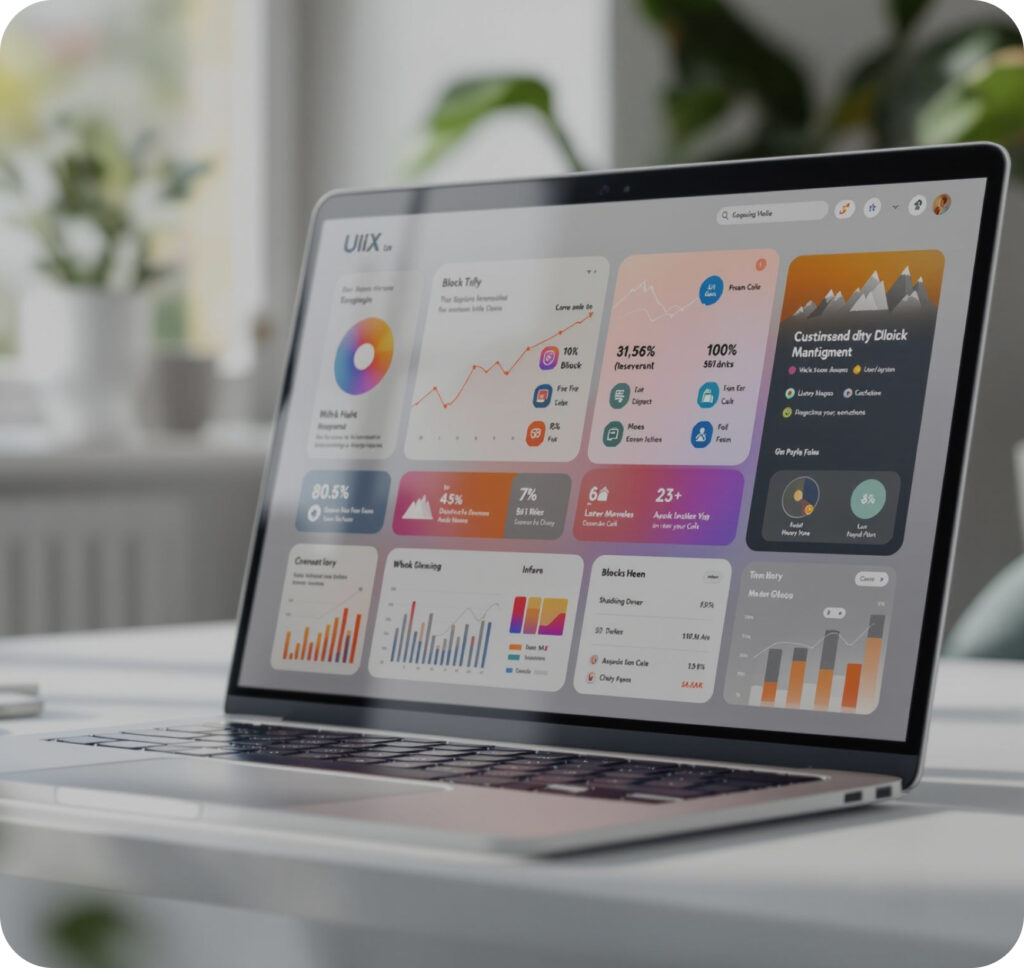The web development market is growing steadily, with websites and platforms increasingly spreading across all sectors of the economy. Businesses and organizations worldwide are undergoing digital transformation and moving their business activities online to meet customers’ expectations of digital access to services and information. This shift has created the need to develop new or modify existing websites, increasing the demand for web development services. Choosing a web developer in today’s saturated market can be difficult. With countless companies all over the world, you can find a multitude of offers.
Large and small companies advertise their expertise with flashy calls to action, attractive prices, and numerous services. This is why choosing a web developer can be so tricky. Potential customers have to scroll through portfolios, read reviews, compare prices, and look for the right company to build their website. However, even with due diligence, there is no guarantee that you will find a qualified company to create a website that fully meets your expectations. The criteria for choosing a web development company are changing as technology evolves. Businesses should look for a company that keeps pace with new technological developments, considers sustainability, and offers customized solutions.
We have asked our CEO – Valentin, what he thinks about choosing an appropriate web service provider. If you are also interested in this, this article is for you.
What makes it challenging to choose a web development company?
So, if you’re reading this article, you’ve probably already dealt with choosing a company to develop your product. Or maybe you decided to ask around before doing so. And yes, it can be difficult due to the following factors.
First, the web development market is oversaturated. Thousands of companies and freelancers worldwide offer their services, each with promises and prices. This diversity complicates the selection process, as a lot of time is spent researching and analyzing offers.
Second, the industry needs to have clear standards. However, there are certain common web development practices, and no standard guarantees the quality of work. This means you may encounter different approaches to development, from good to bad.
Third, it’s pretty difficult to assess the experience and qualifications of potential contractors if you’re new to this. Many firms may have excellent portfolios but may still not implement your project as you want. Reviews and references can help, but they are not always beneficial. In addition, the project budget often limits the choice of a web company. Unfortunately, the price and quality of services do not always coincide, and clients may find themselves in a situation where saving money leads to a lower quality.
How to choose the right web development contractor. Tips from the CEO of Artilab, Valentin Shtefan
Yes, we know that choosing the right web company to develop your website is a significant decision that can affect the success of your projects and your business in the future. The perfect web contractor will bring your ideas to life and help you achieve your business goals. Here are tips from our CEO that will definitely help you make the right choice. P.S. These tips have been successfully tested by our customers.
Web Company evaluation through its website
A web company’s website is its business card, the embodiment of professionalism and creativity. Today, the online environment plays a central role in business, so the absence of a web developer online looks suspicious. When checking a studio’s website, you can judge how well the design is executed, whether enough attention is paid to details, and whether the portfolio of works is complete. These aspects indicate the contractor’s experience and ability to implement high-quality web projects.
Explore the contractor’s portfolio
When looking for a website development contractor, consider the company’s portfolio and experience. What allows you to evaluate the portfolio? Quality of work, variety of projects, and experience in your industry. It’s essential to look for contractors with proven cases (websites you can go to and check) and successful results that match your goals. Real client testimonials and success stories prove a developer’s ability to deliver projects with high customer satisfaction. It is also equally important to determine whether the developer has knowledge of the necessary technologies and can offer innovative solutions for your unique task.
Price equals value
The development price reflects the value you will receive. It should not be too low or too high. I’ll give you an analogy from everyday life: if you buy a cheap phone, you risk getting a device that will break quickly or not meet all your needs. And if you buy an expensive gadget, you may pay for unnecessary features. And you know, it’s not worth it. In web development, the principle is similar: a low price often means subsequent costs for fixing bugs. You can immediately count on higher costs for redesign, modifications, etc. from the other hand – if you decide to pick some modern and pricy technology, there is a huge chance that you will receive a bunch of expensive but unnecessary for your product features.
A company that offers development services should estimate the cost of its services in a balanced way, considering the quality and value of the services provided. Prices that are significantly higher or lower than market prices require additional analysis. Therefore, pay attention to companies in the average market price range. If you understand the value of money, you will make the right and thoughtful choice and, of course, avoid unexpected costs later. It is vital to choose a contractor who provides a reasonable value for their services and with which you clearly understand what you get for your money.
Assess the level of communication
Deep and open communication is the basis for a reliable collaboration between you and the developer. Otherwise, the project may never be completed. This applies to both the developer and you as a client. From the first moments of the interview or phone call, you need to pay attention to the quality of the dialogue: is it easy to communicate, do they listen attentively to your wishes, and are they ready to share their ideas? It is vital that your ideas are heard and considered and that the proposed solution achieves your ultimate goal. However, it is also essential to be clear about your wishes rather than remaining silent hoping that the supplier will guess your thoughts.
Effective dialogue builds trust and mutual understanding and ensures the final product fully meets your expectations. In your communication, pay attention to the development team’s willingness to offer alternatives and compromise. Mutual respect and transparent communication are key elements for a successful collaboration. Thus leading to the creation of practical and functional web solutions.
Speed and efficiency in responding to customer requests
These are also essential factors to consider when it comes to customer service. A quick response to a customer should be almost instantaneous, not a few hours or even the next day. It is important to meet your customer’s needs and maintain high trust and satisfaction. The speed of response demonstrates the company’s professionalism, customer focus, and ability to resolve unforeseen problems or issues effectively. It is also an essential indicator of the quality of service and the company’s readiness to support its customers in any situation.
The desire to provide quality assistance to clients in project development goes far beyond simple technical implementation of the idea.
Let real cases from our clients tell you more about the experience of working with Artilab.
For example, the well-known organization USAID was among our customers. They held a tender in which more than 50 developers participated, and among numerous proposals, they chose our company. The main factor for them deciding to choose our company was our genuine desire to help the customer, our ability to dive deep into their business needs, to ensure open communication. We recommended and worked out the exact solutions that the client needed during business development. Not every company can offer this approach.
Artilab focuses on customer satisfaction and high-quality project implementation, which many of our partners recognize. Our clients’ feedback speaks for itself.
Communication with company representatives is also a crucial aspect
When choosing a developer, you will first talk to the company’s representatives. Whether it is a general manager, CEO, or CBDO, they are all representatives. During communication, pay attention to the clarity and accessibility of information. Check how easily and quickly the company’s employees can answer your questions and provide detailed information about the work process: effective communication channels, such as email, phone, and messaging, will help ensure a smooth project implementation process and avoid misunderstandings.
Pay attention to the company’s willingness to share information and give advice. This indicates a high level of professionalism and a desire to achieve the best result for the client. Clear and specific deadlines and regular reports on project’s progress also indicate good communication.
An important aspect is the company’s ability to listen to and consider the client’s wishes and requirements and adapt the development strategy to the specific objectives of the business. Such communication helps create products that fully meet customer expectations and contribute to achieving business goals.
Talk to the contractor and find out about their processes to achieve a good result
Find out how they organize the development process, from planning and design to development and testing. Ask if they use agile or waterfall development methodologies and how they integrate client requirements into the process. Learning about communication processes is essential: how often they schedule meetings to update the project status, how you will receive reports, and how to make corrections or changes.
Talk about timelines and budgets. Understand how they set deadlines and what guarantees they can provide to meet deadlines. Evaluate their transparency on project costs and what additional costs may arise. Ask about support and maintenance after the website is launched. Knowing how the contractor handles possible problems and updates after the project is complete is important.
Does the company work with a contract?
A contract is an essential precondition for cooperation by a professional web company. Therefore, such a contract—having the legal effect—becomes a critical defense for possible disputes, defining both parties’ rights and obligations, the project’s cost, and payment terms. Often, companies hire organizations without a contract, and without an agreement, the risk of disputes is high.
Terms of reference
Technical tasks are one of the core elements of developing a website. It includes all important aspects of the project, from design to content. The document must contain a detailed description of each element to avoid issues during development. Without it, there is a high probability that flaws will appear in the project; the ToR is presented to the client and signed only when both parties are satisfied with a clear final result.
Who should you choose: a small agency, a big company, or a freelancer?
Deciding between a large company, a small agency, or a freelancer for website production is challenging. Each option has benefits and disadvantages, and you must make an informed choice that best suits your business goals.
Benefits of big companies
- Resources and experience. Large companies have excellent resources and a wealth of experience in a wide range of projects, which means they can deliver quality work.
- Full service. They can offer a full range of services, from design and development to marketing and support.
- Reliability. Large companies are well-known and secure.
Disadvantages of big companies
- High costs. Large companies often need larger budgets due to their size and cost structure.
- Less individualized. Projects may not be handled individually due to the large number of clients.
- Bureaucracy. Internal procedures and hierarchies can slow down the work process.
Choosing a big company:
For large, complex projects: If your project has an enormous scope and complex integrations, or you plan to scale quickly, a large company with significant resources and experience can best meet your needs. When you need high reliability and security – larger firms usually have more advanced security infrastructure and quality control processes, which is critical for projects requiring high data protection.
Benefits of small agencies
- Flexibility. Smaller agencies are often more flexible in managing projects and responding to changes.
- Personal approach. Smaller agencies can offer a more personal approach and individual attention to projects.
- Cost-effectiveness. Smaller agencies can offer competitive prices while maintaining a high quality of work.
Disadvantages of small agencies
- Limited resources. Resources may be scarce or have a different expertise level than larger firms.
- Stability risk. Smaller agencies may be more vulnerable to financial shocks.
Choosing a small company:
For medium-sized projects with further development: If your business is in a growth phase and you’re looking for a partner who can offer ideas and guidance, a small agency is the best choice. The request for teamwork: Small companies usually have teams of designers, developers, testers, and project managers, providing a comprehensive approach to website development.
Benefits of Freelancer
- Flexibility. Freelancers often are the most flexible about the work schedules and working conditions.
- Lower cost. Developing a website with a freelancer can be less expensive because they don’t have to cover additional operational costs.
- Direct communication. You have the opportunity to communicate directly with the executor.
Disadvantages of Freelancer
- Limited resources. A single freelancer may need to gain all the skills required to implement a complex project.
- Risk of unreliability. When working with freelancers, it can be more challenging to ensure that deadlines and quality of work are met.
Choosing a freelancer:
For startups and small projects: A freelancer may be the perfect option if you’re running a startup or have a small project with a limited budget. Freelancers usually offer more flexible rates and a personalized approach. If your project requires a particular skill or expertise and not a complex solution, a freelancer with the right specialization may be the best solution.
Here we would also like to add a comment from our CEO.
Large agencies usually offer a full range of services, covering everything from development to marketing and SEO. For a business owner, this means that you don’t have to worry about the processes within the project, focusing only on the cost of services, which is usually relatively high. However, possible risks, such as internal misunderstandings within the team, can lead to the lack of the desired result.
But here’s what I want to emphasize: for a business owner with a lower turnover, it can be more profitable to hire different contractors for certain aspects of the project – development, marketing, SEO, etc. – which in total can be cheaper than a complex package of services from one company. Of course, this requires finding really high-quality services and actively communicating with all project participants, but the result is an even better product.
🔎 Read also about why every marketing agency needs a reliable tech partner in 2024
Final Thoughts
Choosing a web contractor is critical for creating a successful online project. Before signing a contract, consider a potential partner’s portfolio, customer reviews, and communication skills. Experience in your field and the ability to offer creative solutions also play a significant role. Specifically, discuss your goals, expectations, and budget to ensure both parties are on the same page.
Trust and transparency in collaboration are crucial to achieving the desired outcome. An open dialog will help identify potential problems and find the best solutions. The contractor must be ready to update you on the project’s progress and promptly respond to any changes or requests.
Signing a detailed contract will provide legal protection for both parties and reduce the risk of misunderstandings in the future. The contract should include clear deadlines, costs, a procedure for making changes, and payment terms. This approach will ensure successful cooperation and help avoid additional costs and delays. Remember, for an effective and quality representation online, you should look for a technical partner rather than just a web contractor. Contact Artilab, and we’ll show you which web development contractor best fits your needs.









